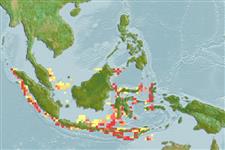Actinopterygii (ray-finned fishes) >
Perciformes (Perch-likes) >
Nemipteridae (Threadfin breams, Whiptail breams)
Etymology: Nemipterus: Greek, nema, -atos = filament + Greek, pteron = wing, fin (Ref. 45335).
Environment / Climate / Range
Ecology
Marine; demersal; non-migratory; depth range 50 - 150 m (Ref. 9785). Tropical, preferred ?; 6°N - 11°S, 94°E - 128°E (Ref. 3810)
Indo-West Pacific: southern Indonesia, Sumatra to Flores. This species is very similar to Nemipterus bathybius.
Size / Weight / Age
Maturity: Lm ? range ? - ? cm
Max length : 18.0 cm SL male/unsexed; (Ref. 3810); common length : 12.0 cm SL male/unsexed; (Ref. 3810)
Dorsal
spines
(total): 10;
Dorsal
soft rays
(total): 9;
Anal
spines: 3;
Anal
soft rays: 7. Suborbital spine absent. Preopercle with 3 transverse scale rows. Pectoral fins long, reaching to or almost to level of origin of anal fin. Pelvic fins moderately long, reaching to or just beyond anus. Upper lobe of caudal fin produced into a short trailing filament. A line drawn upwards from the posterior edge of suborbital reaching the dorsal profile 2 to 5 scale rows before origin of dorsal fin. Axillary scale present. Color: Upper body pinkish, pearly white below. Compared to N. bathybius, this has a more or less straight caudal filament; is more slender and differs in color pattern: lower lateral stripe originates from above the pectoral-fin base; dorsal fin lacks undulating yellow lines; and upper caudal fin and filament red-edged.
Occurs on sand or mud bottoms. Rarely seen in less than 50 m depth (Ref. 48635).
Life cycle and mating behavior
Maturity | Reproduction | Spawning | Eggs | Fecundity | Larvae
Russell, B.C., 1990. FAO Species Catalogue. Vol. 12. Nemipterid fishes of the world. (Threadfin breams, whiptail breams, monocle breams, dwarf monocle breams, and coral breams). Family Nemipteridae. An annotated and illustrated catalogue of nemipterid species known to date. FAO Fish. Synop. 125(12):149p. Rome: FAO. (Ref. 3810)
IUCN Red List Status (Ref. 115185)
CITES (Ref. 94142)
Not Evaluated
Threat to humans
Harmless
Human uses
Fisheries: subsistence fisheries
More information
Common namesSynonymsMetabolismPredatorsEcotoxicologyReproductionMaturitySpawningFecundityEggsEgg development
Age/SizeGrowthLength-weightLength-lengthLength-frequenciesMorphometricsMorphologyLarvaeLarval dynamicsRecruitmentAbundance
ReferencesAquacultureAquaculture profileStrainsGeneticsAllele frequenciesHeritabilityDiseasesProcessingMass conversion
Tools
Special reports
Download XML
Internet sources
Estimates of some properties based on models
Phylogenetic diversity index (Ref.
82805): PD
50 = 0.5000 [Uniqueness, from 0.5 = low to 2.0 = high].
Bayesian length-weight: a=0.01349 (0.00635 - 0.02866), b=2.97 (2.80 - 3.14), in cm Total Length, based on LWR estimates for this Genus-body shape (Ref.
93245).
Trophic Level (Ref.
69278): 3.7 ±0.4 se; Based on size and trophs of closest relatives
Resilience (Ref.
69278): High, minimum population doubling time less than 15 months (Preliminary K or Fecundity.).
Vulnerability (Ref.
59153): Low vulnerability (23 of 100) .
